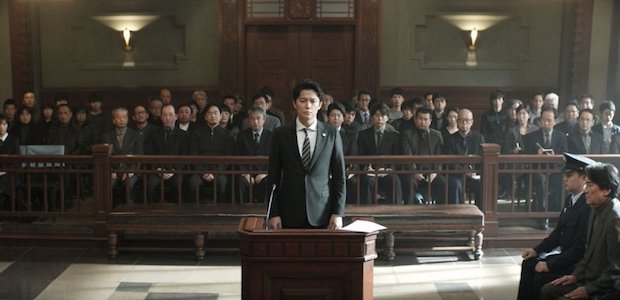The Third Murder
A captivating crime thriller from one of Japan's foremost auteurs, Koreeda Hirokazu.
Plot summary
Misumi (Kōji Yakusho) is facing the death penalty for admitting to the violent murder of his boss. Shigemori (Masaharu Fukuyama) is the lawyer charged with defending him. Despite Misumi’s confession, evidence that Shigemori uncovers makes him start to doubt the seemingly open-and-shut nature of the case, and before long the very concept of ‘truth’ finds itself on trial.

Opening with a sudden and brutal act of violence, The Third Murder introduces its murderer with the same matter-of-factness with which he is viewed by the legal system. Walking along a river bed with a man we soon discover is his boss, Misumi suddenly snaps and clobbers his companion over the head. He continues to strike him once he’s down, before dousing him in gasoline and setting him alight. The fire illuminates Misumi’s face as he looks on with an implacable expression and wipes the blood from his cheek.
From the off, the case is cut-and-dried. Misumi is guilty, there can be no doubt about that. He murdered a man. We saw it with our own eyes. Right? Well, not quite. As soon as Shigemori first sits down with his client, this concrete fact starts to become more and more blurred. First, Misumi starts to change his story. Then, as more witnesses are interviewed, flatly contradictory accounts muddy the waters even further. What should be a straightforward plea bargain instead morphs into an interrogation of accepted fact, and Shigemori finds himself up against the very notion of truth.
The case is riveting, make no mistake about it, and the narrative turns are equal parts measured and scintillating.
Kore-eda makes it clear from the very beginning that he isn’t interested in the thrills and chills of the standard legal procedural. The case is riveting, make no mistake about it, and the narrative turns are equal parts measured and scintillating. But, through Kore-eda’s steady formal guidance, these components work together to tease out much more complex contemplations.
Most immediately apparent is the pacing. As is his wont, Kore-eda allows his action to unfold through slow, measured gestures, giving the story ample breathing space to grow and develop organically. But this idea of space extends to the other elements, too. The meticulous compositions unfold, predominantly, in dreamlike wide shots, with characters often placed at either end of the frame or separated by a visual barrier. The performances – particularly the somber cat-and-mouse relationship of Yakusho and Fukuyama as the accused and the defender, respectively – are similarly disciplined, using physicality and line delivery to emphasise what distances, rather than unifies, us. And the editing, lingering for a beat or two too long, makes the crescendo of a scene not the culmination of the drama, but the lingering effect it leaves.
So, while the murder case may occupy the foreground, it’s the areas around it that are really front-and-centre. This sense of disconnect, of the fundamental inability to truly know one another, permeates the treatment of the narrative, easing the focus away from the nuts-and-bolts of the mystery and towards a more existential exploration of subjective reality. Our quest for truth, the film posits, is perpetually marred by our function as blind men grasping at different parts of an elephant and independently deducing what animal it is.
It’s a lavish, dreamlike work, and it’s certain to infuriate those expecting a puzzle box narrative. But, really, that’s precisely the point. All of the pieces don’t necessarily add up to any coherent whole and, while this is demonstrably damning in a legal context, it’s cinematically and intellectually intoxicating.











COMMENTS